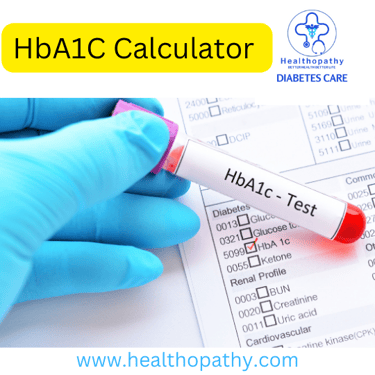Healthopathy's HbA1c Calculator - Manage Your Diabetes with Confidence
At Healthopathy, we understand that managing diabetes can be challenging. That's why we've created an easy-to-use HbA1c Calculator designed to help you track your average blood sugar levels over the past 2-3 months. With personalized guidance based on your HbA1c results, you can confidently make the necessary lifestyle changes to live a healthier life.


How to Use the HbA1c Calculator
Enter your HbA1c level in the designated input field.
Click "Calculate" to see your average blood sugar levels over the past 2-3 months.
Receive personalized recommendations to help you improve your diabetes management.
Limitations of the HbA1c Test
While the HbA1c test is a valuable tool for monitoring diabetes management, it's important to be aware of its limitations. There are certain factors and conditions that can cause false results, potentially leading to incorrect interpretations. Some of these limitations include:
Hemoglobin variants: Hemoglobin variants, such as sickle cell trait or thalassemia, can interfere with the accuracy of the HbA1c test, leading to false results.
Recent blood transfusions: Blood transfusions can cause temporary changes in your hemoglobin levels, affecting the accuracy of your HbA1c test.
Anemia: Anemia, particularly iron-deficiency anemia, can cause falsely elevated HbA1c results due to an increased average red blood cell age.
Kidney disease: Chronic kidney disease may result in falsely low HbA1c levels due to a shorter red blood cell lifespan.
Liver disease: Liver disease can affect the production of hemoglobin and red blood cells, which may impact HbA1c test results.
Pregnancy: HbA1c levels can be affected by changes in blood volume and red blood cell turnover during pregnancy, leading to inaccurate results.
Certain medications: Some medications, such as antiretroviral drugs for HIV, can affect hemoglobin glycation and result in falsely high or low HbA1c levels.
To ensure accurate diabetes management, it's crucial to discuss any of these factors with your healthcare provider, who can help interpret your HbA1c test results and recommend appropriate adjustments to your treatment plan.
